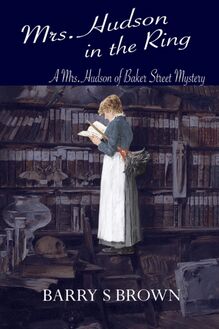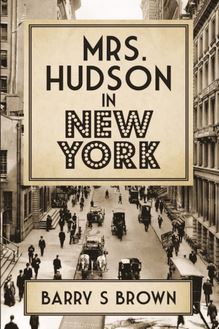Unpleasantness at Parkerton Manor , livre ebook
133
pages
English
Ebooks
2018
Vous pourrez modifier la taille du texte de cet ouvrage
Obtenez un accès à la bibliothèque pour le consulter en ligne En savoir plus
Découvre YouScribe et accède à tout notre catalogue !
Découvre YouScribe et accède à tout notre catalogue !
133
pages
English
Ebooks
2018
Vous pourrez modifier la taille du texte de cet ouvrage
Obtenez un accès à la bibliothèque pour le consulter en ligne En savoir plus
Publié par
Date de parution
12 décembre 2018
Nombre de lectures
0
EAN13
9781787053564
Langue
English
The
Unpleasantness
at
Parkerton Manor
Mrs. Hudson of Baker Street
Book 1
Barry S Brown
2018 digital version converted and published by
Andrews UK Limited
www.andrewsuk.com
Copyright © 2010, 2018 Barry S Brown
The right of Barry S Brown to be identified as the author of this work has been asserted by him in accordance with the Copyright, Designs and Patents Act 1998.
All rights reserved. No reproduction, copy or transmission of this publication may be made without express prior written permission. No paragraph of this publication may be reproduced, copied or transmitted except with express prior written permission or in accordance with the provisions of the Copyright Act 1956 (as amended). Any person who commits any unauthorised act in relation to this publication may be liable to criminal prosecution and civil claims for damage.
All characters appearing in this work are fictitious or used fictitiously. Except for certain historical personages, any resemblance to real persons, living or dead, is purely coincidental. Any opinions expressed herein are those of the authors and do not necessarily represent those of MX Publishing.
MX Publishing
335 Princess Park Manor, Royal Drive,
London, N11 3GX
www.sherlockholmesbooks.com
Cover design by Brian Belanger
To Ann:
Critic and Muse
Lover and Friend
Disclaimer
While grounded, in part, in the extraordinary history of the State of Sarawak, the story fictionalizes certain events in that history to give Mrs. Hudson and her colleagues opportunity to display their skills.
Preface
As readers of Dr. John Watson’s reports are aware, the only description of the intellectual giant who resided at 221B Baker Street is to speak of her stately tread. In the chauvinism that still plagues much of our society this has been interpreted as a negative reference to the good woman’s weight. In fact, it is Watson’s single effort to indicate the authority and respect Mrs. Hudson commanded - at least from him. Indeed, Mrs. Hudson (who incidentally was plump but not overweight) was at pains to remain in the background, recognizing the necessity of her self-inflicted anonymity for the good of the business enterprise she had founded.
Dr. Watson, who was always conflicted about ignoring Mrs. Hudson’s contributions in his writings - in spite of it being her express wish that he do so - yielded to temptation only one time. In his reporting of the case of The Empty House , he describes the heroism of Mrs. Hudson as she defies gunfire to turn a wax bust of her famous boarder in an effort to capture his would-be murderer. The effort is of course successful, the plan is of course the product of Mrs. Hudson’s thinking, and the credit is of course given Sherlock Holmes. It is a familiar story. It is indeed more or less the central theme of the 60 stories penned by Dr. Watson, it being necessary to give credit to the male figurehead of Mrs. Hudson’s consulting detective agency to guarantee its acceptance by a Victorian clientele. Even the good doctor could not give himself over entirely to this deception, and he struck the housekeeper’s name from 46 of those stories rather than continue to minimize her extraordinary contribution.
With the Victorian era well behind us, we no longer have need to maintain Watson’s deception. And so, gentle reader, if you would know the truth of the greatest consulting detective agency ever created you have but to turn the page.
1. Lady Parkerton’s Dilemma
Finding nothing of compelling interest about the gowns in the dressmaker’s window, the woman transferred her attention to the bootmaker’s wares in the adjoining shop. In her fur-trimmed dark flowing coat and feathered high crowned hat, she appeared no different from any of the other stylish matrons taking advantage of the bright winter’s day to examine the displays of Baker Street’s several artisans. Only her frequent glances to the apartments at 221B across the roadway made it clear to Mrs. Hudson that the woman’s interest lay in something other than fine needlework and well-crafted footwear.
She was about to desert the vigil she had been maintaining at her parlor window when, with a sudden heave of shoulders, the woman tore herself from the shopkeepers’ displays and darted into the street, causing the driver of a hansom to jerk his startled horse out of her path and a shaken passenger to shout his fright to her back. Even Mrs. Hudson let out a soft cry, rattling her cup to its saucer, and holding her breath until the woman stood safe in front of the brown sandstone building that was her goal.
Staring hard at the lodgings of Sherlock Holmes, she shifted the hat box she carried from one gloved hand to the other, propped up the fur collar of her coat and, with a small shake of her head, pressed forward to complete her journey. Mrs. Hudson patted into place the grey coils that wound above her jowly face, smoothed down her formless black dress and went to admit Mr. Holmes’ latest visitor.
Inside the lodgings’ small foyer, the woman nodded recognition of Mrs. Hudson, addressing her with the polite indifference of someone accustomed to instructing the behavior of servants. “Good morning. I am Lady Parkerton. I don’t have an appointment, but I wish to see Mr. Holmes on a matter of the utmost importance. It concerns the death of my husband, Sir Stanley Parkerton.”
Mrs. Hudson pursed her lips hard together; she understood all too well the pain of losing one’s husband. “I’m sorry to hear of it ma’am. I’m Mrs. ’Udson, Mr. ’Olmes’ ’ousekeeper.” She was, in fact, Holmes’ landlady, but often found it useful to describe herself as his housekeeper, a role she also fulfilled. “If you’ll be so good as to wait in the parlor, I’ll let Mr. ’Olmes know you’re ’ere. I believe ’is friend, Dr Watson, is with the gentleman. May I take your things, ma’am?” Over the years at Baker Street, Mrs. Hudson had discarded much of her Cockney background while retaining an unfamiliarity with selected letters of the alphabet. Lady Parkerton waved away the housekeeper’s offer, but unbuttoned the front of her coat in recognition of the fire she could see blazing in the room to which she was directed. Her long dress was as dark as her coat, and Mrs. Hudson noted it was heavily trimmed with crepe.
Lady Parkerton gathered the open coat around her and eased herself onto the edge of a cushion at one end of the couch, setting the hat box beside her. She interlaced the fingers of her gloved hands, placed them in her lap, and steeled herself to share the most terrible secrets of her life with someone she had never met. Mrs. Hudson smiled her exit to the unseeing woman and mounted the stairs to Holmes’ apartment.
As always, when she approached his door unexpected, she did so with apprehension. While his indulgence in the white powder she detested had slackened considerably, it had been only a few months earlier she’d found her boarder off on a binge and unable to have visitors for days. Fortunately, Dr. Watson was with him today and the doctor was not only as much repulsed by Holmes’ drug use as she was, he was also the one person able to keep Holmes in check. The fact that his behavior could drive away business seemed of no consequence to Holmes. And to Mrs. Hudson, that was nearly as unforgivable as the drug use itself.
She knocked twice and called out, “Mr. ’Olmes, it’s Mrs. ’Udson. May I come in, sir?” It was their code to alert Holmes he had a visitor.
“Certainly, Mrs. Hudson.” It was Watson who replied. Holmes was standing by the bookcase, lost in fierce concentration of the volume in hand, the high forehead and slim elegant figure reminding her why he had seemed perfect for her purposes. Watson was seated in his library chair, a stereoscope in hand, stereograph cards stacked neatly on the small corner desk that had been added to the apartment’s furnishings when the two men moved in. They had also brought with them Holmes’ huge roll-top desk which was now covered with a clutter of papers and surrounded on its two sides by at least a dozen volumes, some open, some closed with strips of paper to mark selected pages, and some which were either yet to be opened, or had already been rejected, but not yet returned to their places in the bookcase. It was clear Holmes was well into another of his scientific investigations.
Watson laid the stereoscope beside the cards. “Does this mean there’s a new case for us, Mrs. Hudson?”
She closed the door behind her. “I can’t say as I know for sure, Dr. Watson. It just might be, or it might be nothin’ at all. But I expect you’ll be wantin’ to take notes while we get it sorted out.” She paused while Watson extracted several sheets of foolscap from the desk’s middle drawer and found a pen. He dipped it in the desk’s inkpot and nodded his readiness. “First of all,” she asked, “are either of you familiar with the name ‘Parkerton’?”
Holmes put the book on the mantle and transferred his attention to his fingernails. Again, it was Watson who responded to Mrs. Hudson. “There’s a Dr. Stanley Parkerton, a physician who developed the binaural stethoscope for use in this country. Refined it actually. Is Dr. Parkerton downstairs?”
“Dr. Parkerton ’as died. It’s ’is widow what’s downstairs. You’ll see from the heavy crepe she’s wearin’ she’s in first mournin’. I can’t say as I remember readin’ about ’is death in the papers. Dr. Watson, do you recall seein’ any notice of this Stanley Parkerton’s passin’?
Watson’s genial features clouded over in concentration. “I don’t, although it would be odd, a man of his standing should certainly have received at least a mention.”
“And you, Mr. ’Olmes. Can you recall seein’ anythin’ in relation to the gentleman’s




